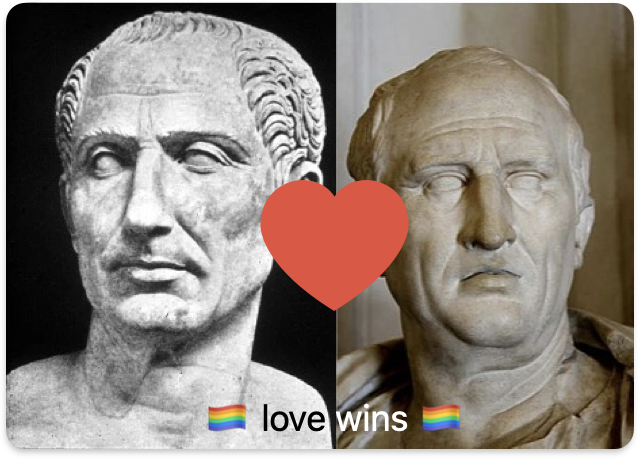Modern Scholarship
1/37
There's no tags or description
Looks like no tags are added yet.
Name | Mastery | Learn | Test | Matching | Spaced | Call with Kai |
|---|
No analytics yet
Send a link to your students to track their progress
38 Terms
Mouritsen (Politics)
There were no 'populares'. Those who employed the strategy of relying entirely on the assemblies to pass laws did so for such a wide range of purposes that the Romans couldn't apply just one label to them
Summary: No such thing as populares because they did things for such a wide range of reasons
Morstein-Marx (Politics 1)
We must at last abandon the old tendency... to write as if being popularis was somehow to be opposed to "the Republic.”
Summary: popularis ≠ anti-Republic
Morstein-Marx (Politics 4/ The Civil War)
'One might say that a Roman civil war was competitive politics by other means.'
Morello (Oratory and Correspondence)
Letters are an inactive genre and it is a cliché of epistolary theory that letters substitute conversation. They anticipate an answer, maintain an apparent realism and seek to minimise the sense of geographical separation between people.
Summary: letters try to maintain realism and ignore the geographical separation.
Stowers (Oratory and Correspondence)
'(The distinction between) warm, personal, spontaneous, artless, common-private-friendly letters and impersonal, conventional, artificial literary letters is extremely misleading.'
Summary: to differentiate between warm and serious letters is misleading.
Taylor (In Verrem)
Cicero was a Roman patriot, and he did have... a sense of obligation to this oldest of the Roman provinces [Sicily]. He speaks with obvious sincerity when he praises the land itself and Sicily's past relations with Rome... But this was a crucial time in the career of Cicero, and it must be admitted that he would not have taken the case if he had not been convinced that it would further his career.' (especially considering that the rest of his extortion speeches were defensive.)
Summary: Cicero was a patriot but the case was also important for his career.
Rawson (In Verrem)
'It is likely that Cicero's heart was to some extent in his case. It was not necessary to be an extreme popularis to think some reform was needed... what the People wanted was simply honest government.'
Summary: It was not extreme of Cicero to think that some reform was needed.
Grant (Cicero' Principles)
Cicero was not often a successful politician, but his true greatness lies in his belief that dictatorial rulers were wrong to suppress individual freedom. He suggested that true authority lay not in people, but in unchangeable morals which they cannot alter.
Summary: Cicero believed dictatorial rulers were wrong to suppress individual freedom.
Tempest (Cicero's Principles)
'Cicero did not hate the dictator as a man, but he did hate the fact that Caesar had no desire to restore the Republic.'
Summary: Cicero didn’t hate Caesar personally, but for not restoring the Republic.

Everitt (Cicero's Principles)
'...his basic aim - to restore traditional political values -remained unchanged throughout his life, although in his last two years his character hardened and he became willing to adopt unconstitutional methods.'
Summary: Cicero’s principles remained the same; he was just more willing to use more unconstitutional methods in his last 2 years
Mouritsen (Catiline)
'Catiline may be the classic example of an indebted aristocrat driven to desperate actions, but most likely he was simply an extreme manifestation of a wider structural problem, which affected large sections of the Roman elite.'
Summary: Catiline was an aristocrat driven to extremes
Parenti (Catiline)
Cicero's strategy was to demonise and isolate Catiline, push him to the wall, and goad him into an act of unlawful resistance, while creating a sense of alarm within the city. He then used the 'perilous emergency' as an opportunity to restore the authority of the inner circle of aristocratic senators, earning their gratitude and thus glory for himself.
Summary: Cicero coerced Catiline into terrorism to gain auctoritas
Billows (Caesar's Consulship/Caesar)
'He knew he could not (fail to pass his land laws) if he was determined enough, and determination was a quality he never lacked.'
Summary: determination

Gelzer (Caesar's Consulship/Caesar 1)
For Caesar, achieving his goals was more important to him than how he did it, using almost popular, revolutionary tactics, like flaunting his strength to influence the comitia. These kinds of actions were a result of the restrictive nature of the Roman constitution.
Summary: destination > journey because of restrictive constitution
Chrissanthos (Caesar's Consulship)
The outbreaks of violence during Caesar's consulship ultimately led to the end of the Republic. It allowed the Triumvirate to seize power, pass laws and support the careers of people like Clodius who would then have a significant effect on politics. Caesar gained his three proconsular provinces, and 10 legions which helped him conquer Gaul. His consulship marked the start of the Republic's decline.
Morstein-Marx (Caesar's Principles 4)
We may say that civil war reconciliation is a "red thread" that runs through Caesar's career from beginning to end.
Parenti (Cato’s Principles 1)
'Caesar accumulated individual power in order to break the oligarchic stranglehold and thereby initiate popular reforms. Without too much overreaching, we might say that his reign can be called a dictatorship of the proletarii, an instance of ruling autocratically against plutocracy on behalf of the citizenry's substantive interests.'
Summary: Cato’s principles bent when optimates needed; otherwise he was stubborn.
Osgood (Cato's Principles)
'Cato's obstruction and boycotts were in their own way revolutionary and damaging, both inciting Caesar's escalation and precluding any alternative solution. In trying to throttle Caesar, Cato had throttled compromise, an essential feature of politics.'
Scullard (The First Triumvirate/The Civil War)
'Its formation was a turning point in the history of the Free State, and it was, as both Cicero and Cato recognised, the ultimate origin of the Civil War of 49 BC.'
Summary: First Triumvirate was the ultimate cause of the civil war.
Tatum (The First Triumvirate 1)
'The destruction of the republic was hardly what any of the three had in mind at the time. Crassus, Pompey and Caesar each had his own immediate agenda, which for none of them included toppling the state.'
Summary: Pompey, Caesar, and Crassus weren’t interested in destroying the Republic, just fulfilling their personal agendas.
Billows (The First Triumvirate)
The political pact the Triumvirate formed was a traditional part of Roman politics. It was how the state had been governed for centuries- by leading men forming agreements to implement certain policies or laws that they deemed necessary or for the good of the state. Even the optimates fit this mould.
Summary: the First Triumvirate was a pact that was a traditional part of Roman politics, even applicable to the optimates.
Goldsworthy (The First Triumvirate)
'Cato and the other nobles who had blocked and embittered the two greatest men in the Republic had created the opportunity to (form the triumvirate)'
Summary: Cato’s stubbornness was at fault for the creation of the First Triumvirate.
Seager (Cicero's Exile)
'Pompeius had finally decided to sacrifice Cicero.'
Billows (Cicero's Exile)
'Cicero's exile, though Caesar personally regretted it and would have saved him from it, had shown that the optimates had neither the will nor the power to stand up against their opponents'
Summary: Cicero’s exile showed optimates had no power nor will to stand against their opponents.
Brunt (Amicitia/Cicero's Principles)
Cicero's hesitations in 49 BC reflect his inner conflict between loyalty to Pompey, fear of tyranny under either side, and a longing for compromise, as well as his sense of duty. Torn between the causa bonorum and the turpitudo of civil war, he often justified his position through personal loyalty, suggesting that in such uncertainty, friendship could rightly guide a man of honour.
Steel (Amicitia)
Without formal political parties, Roman politicians depended on personal alliances, often described as amicitia, which ranged from deep emotional bonds to strategic, superficial connections. These relationships carried ethical obligations, and during the civil war of 49 BC, individuals had to balance loyalty to friends with political judgment and self-interest.
Summary: amicitia > political parties. Civil war was a balance of loyalty and self-interest
Scullard (The Civil War)
Civil war wasn't desired by Caesar- see his negotiations, Pompey- see his indecisiveness, or most of the senators- see the vote, but the small faction of 22 optimates who votes against Curio's disarmament proposal.
Summary: Caesar didn’t want war.
Morstein-Marx (The Civil War 2)
The 370-22 vote count shows how few (literally twenty-two optimates) were actually prepared to take strong measure against him that ran a real risk of precipitating a civil war.
Summary: 370-22 vote showed how few were willing to stand up to Caesar.
Bradley (Pompey)
'His [Pompey's] career embodied everything that the oligarchy opposed and yet they were responsible for granting him many of his exceptional appointments. He was a catalyst in the breakdown of the republic, and yet his friendship was eagerly sought by the conservative Cicero and he died in 48 leading the republicans. His whole career was a paradox.'
Summary: His whole career was paradoxical: he was an antithesis of the Republic but the Senate granted him his exceptions.
Mitchell (Pompey)
('Pompey) wished for power freely given and for acclaim gratefully bestowed by a reverential public for glorious achievements in the service of the state.'
Summary: Pompey wanted glory given by grateful subjects.
Goldsworthy (Caesar's Dictatorship)
'Rome was better run than it had been for decades, even if things were not being done in the traditional way.'
Tatum (Caesar's Dictatorship)
'Once Caesar attained absolute power.. he abandoned the causa popularis entirely.'
Rawson (Caesar's Assassination)
'Tragic, too, are many of the other figures of the time: the brilliant Caesar, trapped at last by megalomania and a partly justified contempt for a tradition that others still revered...'
Summary: Caesar’s downfall was his megalomania.
Parenti (Caesar's Assassination)
'The Senate aristocrats killed Caesar because they perceived him to be a popular leader who threatened their privileged interests.'
Summary: Senatorial aristocrats murdered Caesar for threatening their prvilege.
Morstein-Marx (Caesar's Assassination 2)
'Caesar's assassination... did the most to fuel the cycle of destruction that would in time tear the life out of the republic. The killing unleashed extraordinarily powerful emotions - a lust for bloody vengeance opposed by exultation in reclaimed freedom.'
Summary: Caesar’s assassination fuelled the cycle of destruction that caused the fall of the Republic.
Meier (Caesar's Assassination)
Cicero's belief that it was planned with 'the courage of men but the understanding of boys' shows the one-sidedness of the late republic: these honourable republicans were convinced that the republic would be restored with Caesar dead, but understood nothing of the conditions that made his ascendancy possible.
Summary: Republicans thought the Republic would be restored w/ Caesar dead but didn’t understand why he came to power.
Tempest (Rome Post-Assassination 2)
'(Cicero) had perished... with his neck out-stretched in defence of liberty and the Republic. He may only have entered the fray in defence of an ideal that was past saving, but Cicero had resolved to fight to the end rather than submit to tyranny.'
Summary: Cicero had rathered fighting to the end > submitting to tyranny.
Rawson (Rome Post-Assassination/Cicero 1)
'The next six months (the first half of 43) were the heroic period of Cicero's career, his aristeia as the Greeks would term it.'
Summary: first half of 43 was Cicero’s heroic period.